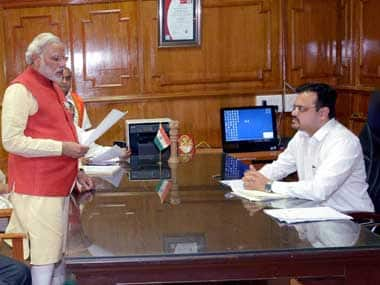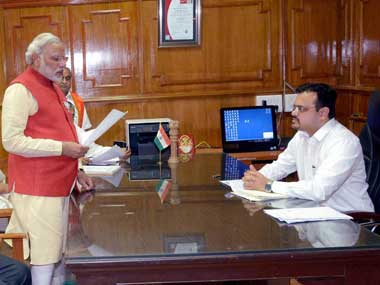The photograph in yesterday’s Indian Express showed Narendra Modi striding into the Collector’s office in Vadodara to file his nomination in Collector Vinod Rao’s office was revealing. He was sitting, waiting for Modi to take a chair before starting the proceedings. In normal times, officials of all ranks would normally be summoned, and wait before being ushered into an office occupied by a person elected. In many a case some dare not even take a seat till the gesture—a nod or a sweep of hand—towards the visitors’ chair.[caption id=“attachment_1476477” align=“alignleft” width=“380”]
 BJP prime ministerial candidate Narendra Modi filing his nomination papers for the Lok Sabha elections 2014 in Vadodara on Wednesday. PTI[/caption] Come elections, things change. A Collector with a sway over an entire district, wielding a combination of quasi-judicial and executive powers, does what you saw, including on the television screens – remain in his seat. A constable, often a ‘hey-you!’ for the political brass, elected to any office or otherwise, conducts himself with remarkable panache when polls are on at various points, and the teachers drafted to carry the last-mile operations at the booths and counting places grumble not. It is a sense of doing something right well. It would have been so had even an incumbent prime minister come with a re-nomination. For, here, the officials were doing things strictly by the rule, backed by the authority of The Election Commission of India which can be—and is—unbending as Mamata Banerjee recently found out. Anything that comes within the remit of the EC is dealt with an even-handedness which makes even an ordinary videographer who normally shoots weddings to feel he is something because he was doing momentous things: help supervise the greatest event periodically held by recording poll events to spot mischief by candidates. This does not mean that the seated returning officer is returning the favour to the insouciance of people in political office which extends to attempts, not always unsuccessful, of co-opting the officialdom into nefarious deals. It only means that during elections, law returns to the land, more or less. More or less, because the EC has so far failed to check the unbridled expenditure by the candidates and its concealment, and allowing money whose origins we do not even know to be spent, officially, by the parties which have no limits. Otherwise, it is a real humdinger. It is a far cleaner process progressively improved since 1952 elections. If in 1951-52, Sukumar Sen battled odds—largely illiterate populations bestowed with the rights under adult suffrage, having to devise symbols to link candidates to parties to the voters, prepare ballot papers and boxes including that indelible ink which some senior politicians now would like was no so indelible—it is the growing number of voters now. Amid all this, the defiance of Mamata Banerjee to follow EC’s orders transferring suspect officials to ensure free and fair elections, later agreed to by her, is the assumption of politicians who think because they are elected, their actions are not justiciable. It is EC’s quiet assertion of its duties confirms it is independent. It is not that Mamata’s brush with the EC was unprecedented. TS Krishnamurthy, a former CEC recently said on a TV show that when he was told by a chief secretary that similar orders he had given would be done by consulting the then chief minister of a state, he just asked, “Do you want to continue to be in the post?” A former chief secretary of West Bengal, BS Raghavan, writing in rediff.com, recalled how Digvijaya Singh, Madhya Pradesh’s chief minister in 2003 “similarly took a public stand against the EC’s order to shift three district collectors”. Two years later, Haryana’s Om Prakash Chautala showed his “umbrage” at being told to transfer a DGP whose wife was a candidate. Like Mamata did, Chautala too imputed motives to Krishnamurthy but had to buckle under. Raghavan details how “Chautala’s government would ’neither issue orders for his transfer nor submit any panel (of names for new police chief) to the EC’, and called the EC Congress’ ’tool’ made ‘of retired bureaucrats rewarded for their loyalty to the party…’ (who) get EC posts for six years and go all out to help the Congress… After their term in the EC, they eye a Rajya Sabha nomination as an incentive…” In 2006, EC reasserted its powers via the Supreme Court when a high court stopped its powers to transfer Chennai Police Commissioner for his ‘positive leaning towards a particular leader of the ruling party’. The apex court upheld its power to ‘direct transfer of officials involved in election related work for the conduct of free and fair elections’. But for these politicians in high stake games who try to sail close to the wind, it has to become increasingly clear that EC has what is called substantial plenary powers to maintain the cleanliness of the poll process which does injures the politician’s craving to acquire a seat somehow. Its oversight and control is absolute. How does all this happen? Because, as ex- chief commissioner, SY Quraishi puts it, this “greatest man-made exercise” is “conducted entirely by the much-derided bureaucracy” which see polls an “opportunity to prove their competence”, and “insulated from political pressures”, deliver what “Hillary Clinton recently described as the ‘global gold standard”’. Yes, the EC may slip a bit here and there, like not yet providing a symbol for NOTA—none of the above—on its voting machines. This led, following a PIL, the Andhra Pradesh High Court to make it a requirement so the illiterate can spot it if they intended to exercise that right ordained by the Supreme Court. To The Economist the EC’s success is a “puzzling” triumph as Indians are typically “dismissive about the capacity of the state” to do anything right. It nicely explained the successes to the “value of setting a simple, well-defined target” and “narrowly focused tasks of limited duration that are regularly repeated”. That makes EC a palpably, even visibly, a fair institution.
BJP prime ministerial candidate Narendra Modi filing his nomination papers for the Lok Sabha elections 2014 in Vadodara on Wednesday. PTI[/caption] Come elections, things change. A Collector with a sway over an entire district, wielding a combination of quasi-judicial and executive powers, does what you saw, including on the television screens – remain in his seat. A constable, often a ‘hey-you!’ for the political brass, elected to any office or otherwise, conducts himself with remarkable panache when polls are on at various points, and the teachers drafted to carry the last-mile operations at the booths and counting places grumble not. It is a sense of doing something right well. It would have been so had even an incumbent prime minister come with a re-nomination. For, here, the officials were doing things strictly by the rule, backed by the authority of The Election Commission of India which can be—and is—unbending as Mamata Banerjee recently found out. Anything that comes within the remit of the EC is dealt with an even-handedness which makes even an ordinary videographer who normally shoots weddings to feel he is something because he was doing momentous things: help supervise the greatest event periodically held by recording poll events to spot mischief by candidates. This does not mean that the seated returning officer is returning the favour to the insouciance of people in political office which extends to attempts, not always unsuccessful, of co-opting the officialdom into nefarious deals. It only means that during elections, law returns to the land, more or less. More or less, because the EC has so far failed to check the unbridled expenditure by the candidates and its concealment, and allowing money whose origins we do not even know to be spent, officially, by the parties which have no limits. Otherwise, it is a real humdinger. It is a far cleaner process progressively improved since 1952 elections. If in 1951-52, Sukumar Sen battled odds—largely illiterate populations bestowed with the rights under adult suffrage, having to devise symbols to link candidates to parties to the voters, prepare ballot papers and boxes including that indelible ink which some senior politicians now would like was no so indelible—it is the growing number of voters now. Amid all this, the defiance of Mamata Banerjee to follow EC’s orders transferring suspect officials to ensure free and fair elections, later agreed to by her, is the assumption of politicians who think because they are elected, their actions are not justiciable. It is EC’s quiet assertion of its duties confirms it is independent. It is not that Mamata’s brush with the EC was unprecedented. TS Krishnamurthy, a former CEC recently said on a TV show that when he was told by a chief secretary that similar orders he had given would be done by consulting the then chief minister of a state, he just asked, “Do you want to continue to be in the post?” A former chief secretary of West Bengal, BS Raghavan, writing in rediff.com, recalled how Digvijaya Singh, Madhya Pradesh’s chief minister in 2003 “similarly took a public stand against the EC’s order to shift three district collectors”. Two years later, Haryana’s Om Prakash Chautala showed his “umbrage” at being told to transfer a DGP whose wife was a candidate. Like Mamata did, Chautala too imputed motives to Krishnamurthy but had to buckle under. Raghavan details how “Chautala’s government would ’neither issue orders for his transfer nor submit any panel (of names for new police chief) to the EC’, and called the EC Congress’ ’tool’ made ‘of retired bureaucrats rewarded for their loyalty to the party…’ (who) get EC posts for six years and go all out to help the Congress… After their term in the EC, they eye a Rajya Sabha nomination as an incentive…” In 2006, EC reasserted its powers via the Supreme Court when a high court stopped its powers to transfer Chennai Police Commissioner for his ‘positive leaning towards a particular leader of the ruling party’. The apex court upheld its power to ‘direct transfer of officials involved in election related work for the conduct of free and fair elections’. But for these politicians in high stake games who try to sail close to the wind, it has to become increasingly clear that EC has what is called substantial plenary powers to maintain the cleanliness of the poll process which does injures the politician’s craving to acquire a seat somehow. Its oversight and control is absolute. How does all this happen? Because, as ex- chief commissioner, SY Quraishi puts it, this “greatest man-made exercise” is “conducted entirely by the much-derided bureaucracy” which see polls an “opportunity to prove their competence”, and “insulated from political pressures”, deliver what “Hillary Clinton recently described as the ‘global gold standard”’. Yes, the EC may slip a bit here and there, like not yet providing a symbol for NOTA—none of the above—on its voting machines. This led, following a PIL, the Andhra Pradesh High Court to make it a requirement so the illiterate can spot it if they intended to exercise that right ordained by the Supreme Court. To The Economist the EC’s success is a “puzzling” triumph as Indians are typically “dismissive about the capacity of the state” to do anything right. It nicely explained the successes to the “value of setting a simple, well-defined target” and “narrowly focused tasks of limited duration that are regularly repeated”. That makes EC a palpably, even visibly, a fair institution.
Mahesh Vijapurkar likes to take a worm’s eye-view of issues – that is, from the common man’s perspective. He was a journalist with The Indian Express and then The Hindu and now potters around with human development and urban issues.
)